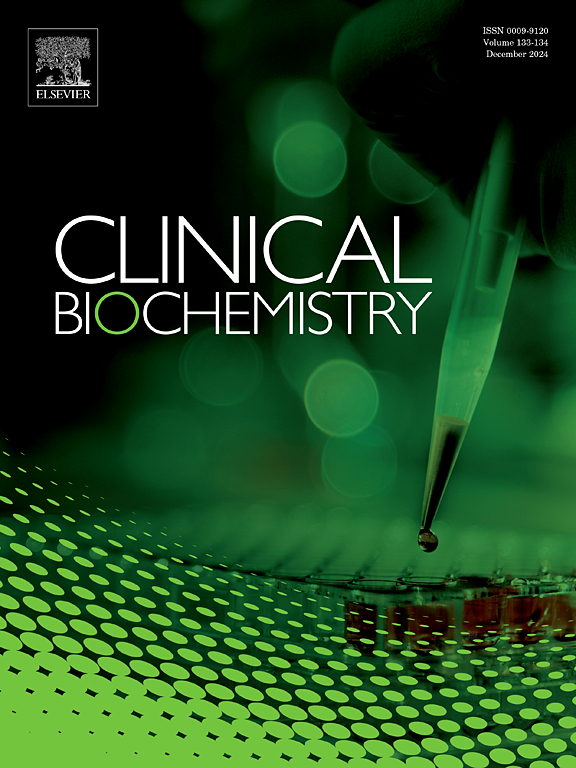Reducing unnecessary free thyroid hormone testing by the reinforcement of a reflexive algorithm in an outpatient environment
IF 2.1
3区 医学
Q2 MEDICAL LABORATORY TECHNOLOGY
引用次数: 0
Abstract
Background
Thyroid dysfunction is one of the most common endocrine disorders. Thyroid function tests, including TSH, Free T4, and Free T3, are essential for diagnosis and patient management. Current guidelines recommend TSH as the first-line test, with additional testing for Free T4 and Free T3 only when TSH is abnormal or in specific clinical scenarios. Despite guideline recommendations, inappropriate ordering of free hormone tests is prevalent, leading to increased healthcare costs, diagnostic inefficiencies, and potential patient burden. In this study, we aimed to assess thyroid function testing utilization in the Saskatoon Health Region and identify opportunities to enhance test appropriateness.
Methods
A retrospective analysis of thyroid function test utilization was conducted in the Saskatoon Health Region to identify gaps in guideline adherence. Inappropriate Free T4 and Free T3 testing was defined as tests ordered with TSH results in the laboratory reference range. Interventions were developed, including reinforcing the reflexive testing algorithm in outpatient settings and restricting free hormone testing to pre-approved specialists. Metrics for evaluation included testing volume trends, physician satisfaction, and cost savings.
Results
Pre-intervention analysis revealed significant increases in thyroid function testing volumes from 2016 to 2019: TSH orders increased by 34.5 %, Free T4 by 36.4 %, and Free T3 by 18.8 %. A substantial proportion of tests involved normal TSH ordered in combination with Free T4 and/or Free T3, which is unnecessary. Compared to baseline volumes, post-intervention Free T4 and Free T3 testing volumes decreased by approximately 60 % and 40 %, respectively.
Conclusion
Implementing and reinforcing a reflexive thyroid testing algorithm substantially reduced inappropriate Free T4 and Free T3 testing. Utilization management improved diagnostic efficiency, reduced unnecessary healthcare costs, and minimized patient harm.
通过在门诊环境中加强反射算法来减少不必要的免费甲状腺激素测试。
背景:甲状腺功能障碍是最常见的内分泌疾病之一。甲状腺功能检查,包括TSH、游离T4和游离T3,对诊断和患者管理至关重要。目前的指南建议将TSH作为一线检测,只有当TSH异常或在特定的临床情况下,才能进行游离T4和游离T3的额外检测。尽管有指南建议,但不适当的免费激素检测仍然普遍存在,导致医疗成本增加、诊断效率低下和潜在的患者负担。在本研究中,我们旨在评估萨斯卡通卫生地区甲状腺功能检测的使用情况,并确定提高检测适当性的机会。方法:回顾性分析萨斯卡通卫生地区甲状腺功能检查的使用情况,以确定指南依从性方面的差距。不适当的游离T4和游离T3检测被定义为TSH结果在实验室参考范围内的检测。制定了干预措施,包括加强门诊设置的反射性检测算法,并将免费激素检测限制在预先批准的专家身上。评估指标包括检测量趋势、医生满意度和成本节约。结果:干预前分析显示,2016年至2019年甲状腺功能检测量显著增加:TSH订单增加34.5% %,游离T4增加36.4% %,游离T3增加18.8% %。相当大比例的测试涉及正常TSH与游离T4和/或游离T3的组合,这是不必要的。与基线量相比,干预后的游离T4和游离T3检测量分别减少了约60% %和40% %。结论:实施并强化一种反射性甲状腺检测算法,大大减少了不适当的游离T4和游离T3检测。利用管理提高了诊断效率,减少了不必要的医疗保健成本,并最大限度地减少了对患者的伤害。
本文章由计算机程序翻译,如有差异,请以英文原文为准。
求助全文
约1分钟内获得全文
求助全文
来源期刊

Clinical biochemistry
医学-医学实验技术
CiteScore
5.10
自引率
0.00%
发文量
151
审稿时长
25 days
期刊介绍:
Clinical Biochemistry publishes articles relating to clinical chemistry, molecular biology and genetics, therapeutic drug monitoring and toxicology, laboratory immunology and laboratory medicine in general, with the focus on analytical and clinical investigation of laboratory tests in humans used for diagnosis, prognosis, treatment and therapy, and monitoring of disease.
 求助内容:
求助内容: 应助结果提醒方式:
应助结果提醒方式:


